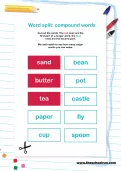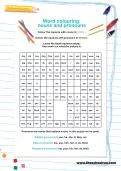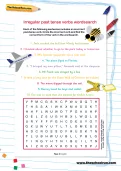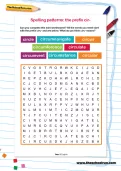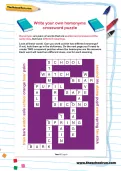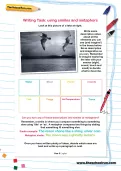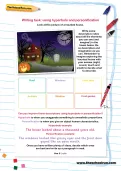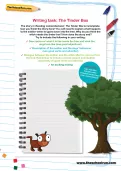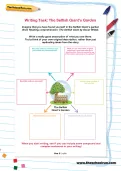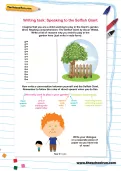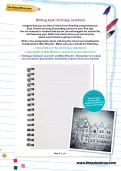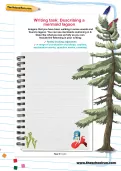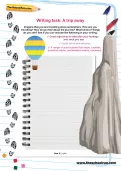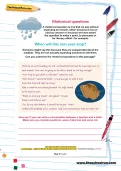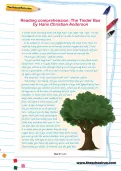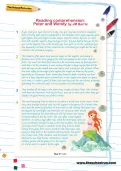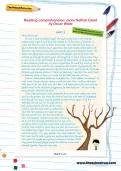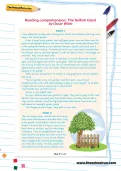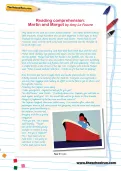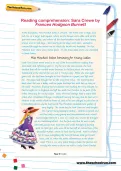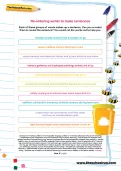Emmanuel has just been to the circus. He has written various sentences about his time there. Can you identify the subject, verb and object in each one? Underline the subject in green, the
verb in purple and the object in orange.
or
Register to add to your saved resources
Already a subscriber? to view this content.
These sentences contain a subject, verb and object. Underline the subject in green, the verb in purple and the object in orange.
or
Register to add to your saved resources
Already a subscriber? to view this content.
See if you can turn these active sentences into passive sentences.
or
Register to add to your saved resources
Already a subscriber? to view this content.
A Year 4 English worksheet created by an experienced teacher to help your child understand active and passive voice, with examples.
or
Register to add to your saved resources
Already a subscriber? to view this content.
Look at this picture of a lake at night. Write some descriptive notes about all the elements you can see (and imagine!). Be as descriptive and imaginative as you can. Now can you turn any of these descriptions into similes or metaphors?
or
Register to add to your saved resources
Look at this picture of a haunted house. Write some descriptive notes about all the elements you can see (and imagine!). Be as descriptive and imaginative as you can. Remember to imagine exploring the
haunted house with your senses (sight, sound, touch and smell) to decide what to describe. Now, can you improve these descriptions using hyperbole or personification?
or
Register to add to your saved resources
Already a subscriber? to view this content.
The story in Reading comprehension: The Tinder Box is incomplete. Can you finish the story here? You will need to explain what happens to the soldier when he goes down into the tree. Why do you think the witch needs the tinder box? How does the story end? Try to include good adjectives, correct speech punctuation and plenty of good verbs and adverbs in your writing.
or
Register to add to your saved resources
Already a subscriber? to view this content.
Imagine that you have found yourself in the Selfish Giant’s garden (from Reading comprehension: The Selfish Giant by Oscar Wilde). Write a really good description of what you see there. Try to think of your own original description, rather than just replicating ideas from the story.
or
Register to add to your saved resources
Already a subscriber? to view this content.
Imagine that you are a child wanting to play in the Selfish Giant’s garden. Write a list of reasons why you want to play in the garden here (just write in note form).
or
Register to add to your saved resources
Already a subscriber? to view this content.
Imagine that you are Sara Crewe (from Reading comprehension: Sara Crewe) arriving at boarding school on your first day. You are dressed in clothes that are far too extravagant for school life, sad because your father has had to leave you and anxious about what school is going to be like. Write a few paragraphs about entering the school and meeting the headmistress, Miss Minchin.
or
Register to add to your saved resources
Already a subscriber? to view this content.
Imagine that you have been walking in some woods and found a lagoon. You can see mermaids swimming in it. Describe what you see as fully as you can.
or
Register to add to your saved resources
Already a subscriber? to view this content.
Imagine that you are travelling alone somewhere. How are you travelling? How do you feel about the journey? What kinds of things do you see? See if you can include good adjectives, verbs and adverbs and a range of punctuation in your writing.
or
Register to add to your saved resources
Already a subscriber? to view this content.
A rhetorical question is one that we ask without expecting an answer, either because it has an obvious answer or because we have asked the question to make a point, to persuade or for literary effect. Now see if you can write a conversation between a teacher and a child. Make sure you include questions, some rhetorical and some not.
or
Register to add to your saved resources
Already a subscriber? to view this content.
Read this extract from The Tinder Box by Hans Christian Anderson then carefully answer the questions below.
or
Register to add to your saved resources
Already a subscriber? to view this content.
Read this extract from Peter and Wendy by JM Barrie then carefully answer the questions.
or
Register to add to your saved resources
Already a subscriber? to view this content.
Read this second extract from The Selfish Giant by Oscar Wilde and then answer the questions.
or
Register to add to your saved resources
Already a subscriber? to view this content.
Read this passage from The Selfish Giant by Oscar Wilde then carefully answer the questions below.
or
Register to add to your saved resources
Already a subscriber? to view this content.
First read this extract from Martin and Margot by Amy Le Feuvre, then carefully answer the questions.
or
Register to add to your saved resources
Already a subscriber? to view this content.
Carefully read this passage from Sara Crewe, an early version of A Little Princess by Frances Hodgson Burnett, then answer the questions.
or
Register to add to your saved resources
Already a subscriber? to view this content.
Each of these groups of words makes up a sentence. Can you re-order them to reveal the sentence? You could cut the words out to help you.
or
Register to add to your saved resources
Already a subscriber? to view this content.
